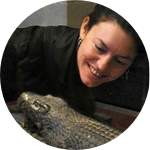About This Project
If Night at the Museum was exciting, then you should know what really goes on behind the scenes in the natural history museum! Those stuffed animals you see in the dioramas are about 10% of what the museum collections hold in their vaults. A window into the past; the animals in dioramas represent thousands of specimens containing detailed records in their DNA. The goal of this project is to compare this DNA, sometimes centuries old, with that of living animals. This will tell us how species have changed, and just maybe, what the future holds.Ask the Scientists
Join The DiscussionWhat is the context of this research?
We can't go back in time, but museum specimens can tell us a lot about what past environments were like. For the initial phase of the project we will sequence the DNA of ~300 specimens including African monitor lizards, leopards, banded mongoose, pangolins and antelope. And here in the US we are using pika and chipmunk specimens to look at climate change in the Sierras.
We will compare the historic patterns of genetic diversity to patterns found today. We want to know three things.
1. Are there cryptic species like the Olinguito! in our collections?
2. Have unique populations disappeared? and
3. Has genetic diversity been lost in the past century?
What is the significance of this project?
Animals collected in the past may hold the key to understanding how best to conserve species in the future. The American Museum of Natural History’s public displays of stuffed ( taxidermy) specimens contain valuable biological data from which we can derive information on conditions occurring a century ago while, at the same time, educating the public about critical factors impacting global biodiversity. In our recent work, we have been using of these archival materials to establish baseline conditions for wild species. The results from these analyses can be added to public displays in a major metropolitan area and help to increase public understanding of our changing planet.
What are the goals of the project?
Because these specimens are over a century old, methods will require double the effort of regular fresh DNA.
The majority of funds will be used to pay for DNA extractions in our clean ( ancient DNA) room and to purchase lab materials.
Budget
The DNA extraction kits are very expensive ($900 each) and we do several replicates because of the lower quality DNA. We are budgeting $2,500 for extractions and consumable lab products.... and maybe a beer or two!
Meet the Team
Affiliates
Team Bio
Evon Hekkala spent her time as an undergraduate relabeling pygmy elephant spears in the basement of the Redpath Museum in Montreal. She has never stopped seeing museums as a way to time travel and now focuses her career highlighting the value of these amazing archives. She has hosted over 30 undergraduates and even a few High School students in her ancient DNA lab!George Amato runs the Sackler Institute for Comparative Genomics at the American Museum of Natural History. He has been active in Conservation Biology for over 25 years and travels the world with a keen eye towards promoting wildlife protection.
Evon Hekkala
I study DNA from specimens from museums to understand how life has responded to planetary changes over time. I have sequenced DNA from crocodile mummies and from extinct crocodiles, as well as from hundreds of other specimens including century old frogs, lizards, chipmunks and leopards.This area of research (ancient or archival DNA) is rapidly expanding with new techniques and these are exciting times for scientists like me.
Although I conduct research on ancient DNA from many animals species, including crocodiles, I wasn't always a scientist and I think that crowd funding is a great way to let people know that everyone can be involved in science no matter what their background.
I had an interesting path to my career in science. You can check it out in more detail here, but I started out as an art student which is why, when I began to study crocodiles, I noticed all of the interesting paintings of "ceiling crocodiles" and the carvings of the crocodile god Sobek related to fertility and health. I happened to take a course on the history of evolutionary theory and was hooked. I switched to anthropology and began studying archeology while volunteering at natural history museums in Montreal, eventually landing a curatorial assistant position at Cal Academy in San Francisco. I think the combination or art history, natural history collections and conservation of crocodiles stirred my fascination with the ways in which people's belief systems intersect with science. Who can resist wanting to know more about the crocodiles hanging from the ceilings of apothecary shops? and who can resist the Crocodylus Apothecary Hypothesis?
Along with this project, we are analyzing genetic data from extinct crocodiles in Madagascar to look at patterns of recent colonization. One hypothesis that we are testing is that impacts associated with the arrival of humans and Nile crocodiles may have resulted in the extinction of Madagascar's endemic horned crocodile (Voay robustus).
Press and Media
Here are a few examples where we used museum specimens to discover entirely new things about creatures we thought we knew. Nile crocodiles are more than one species... Extinct frogs are alive and well ( sort of).My favorite recap of science blog !
Additional Information
We are also working in high elevation sites to understand changing dynamics of species in response to climate change. For some more information about this research, here is a link to a recent publication.Project Backers
- 10Backers
- 33%Funded
- $810Total Donations
- $81.00Average Donation
